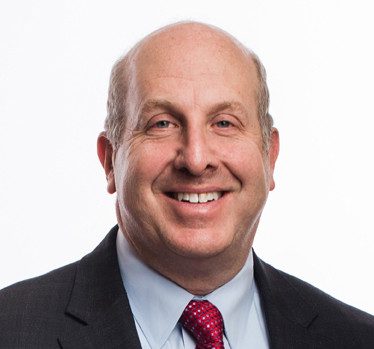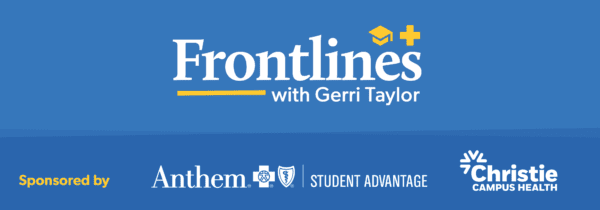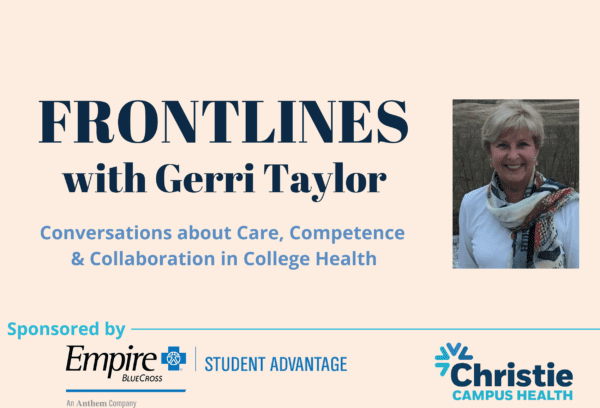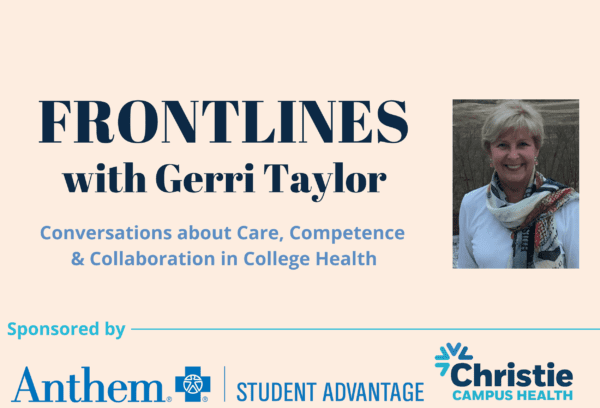
Pace University’s mission is captured in the Latin word “Opportunitas,” which the school defines as “Providing all students, regardless of economic background, access to the transformative power of education.” As evidence that it lives up to its word, Pace has been ranked as the best private, four-year college or university in the nation for upward economic mobility.
Pace’s reputation as a place that prepares many first-generation and lower-income students for successful careers in today’s workforce is reinforced by its president, Marvin Krislov. A Rhodes Scholar who writes frequently in the press about higher education issues and has a track record in promoting diversity, Krislov is passionate about making college a transformative experience intellectually, socially, and economically.
Krislov is equally passionate about student mental health, a dynamic closely tied to persistence. He was recently an advisor to the Steve Fund’s COVID-19 Task Force, which examined the pandemic’s unique impact on students of color.
Pace, like many colleges and universities, saw enrollment challenges at the height of the pandemic. Now, however, its application and enrollment numbers are soaring. Bringing back students who may have stopped their studies and rebuilding their college trajectories is a huge priority for Krislov. To ensure that all these students thrive, Pace is doubling down on its proven student success strategies as well as increasing support for mental health. What Krislov believes is at stake here is not only the continued execution of Pace’s mission, but the long-held belief that higher education provides the best opportunity for a successful life. Here is an excerpt from our interview.
MCI: How would you describe Pace in your own words?
Marvin Krislov (MK): Pace is a multi-campus university that has the mission of preparing a range of people for the world of work. It has always been known as a place that really marries classroom instruction with experiential education, internships, and the like. That commitment to thinking about how education helps prepare people for the workforce has led to a lot of recognition for us.
At the same time, we’ve also been expanding our programs in graduate education. We have a strong performing arts program. We have students performing on Broadway. We have students speaking at the UN and working at Wall Street firms. All of these programs share the fundamental conviction that helping a broad range of students achieve their goals, both in the classroom and outside, is the core of our mission. We are a very student-centered institution. And we have had a very diverse student body for many years and that was something that really appealed to me.
Our motto, Opportunitas, is very special to me. We talk about how higher education can be transformational, and that’s true in many ways. For students who are working class, it is also true economically. In the first year after students graduate from Pace with a bachelor’s degree, their average salary is around $60,000. And a third of our students are Pell-eligible, which is a family income of under $40,000. So just in that first year, this one person completely changes the economics of a family.
MCI: Your economic mobility agenda is nationally recognized, with a large number of first-generation students and those from lower-income families having benefited from it. How has the pandemic affected this?
MK: I think for students who are first generation or working class, there are just a lot of concrete pressures that were greatly exacerbated by the pandemic: taking care of siblings, taking care of elders, family members perhaps losing jobs, getting sick. Some students stopped their education. And that is true across the board, nationwide. But a big concern here, among many, is that students who are more economically disadvantaged or socially vulnerable are coming back less frequently than other students. Our numbers on those who’ve left are pretty consistent with the national average. It’s just that students who decided to take a semester off at a place like Yale are more apt to return to campus.
If a student doesn’t come back to school or really does not seem to be reengaging at all, the consequences for their life, for their earnings, for their satisfaction are enormous.
This is something that I have been working very hard on. If a student doesn’t come back to school or really does not seem to be re-engaging at all, the consequences for their life, for their earnings, for their satisfaction, are enormous. For first-generation students, who are doing something for which they may have no role models, when things go in a different direction they have no one say, “I’ve been there, I’ve done this, here’s how it will work out.” And some of this may add to their questioning whether college is worth it.
The pandemic has created even more pressure on these students and a greater need to reinforce the message: “This is going to pay off. You need to stay with it. Come back. We’ll make it work for you.” On the most basic level, I want them to thrive. I want them to succeed. I want them to feel supported. We have been able to bring many back and I’m really proud of them, but I’m really focused on reaching out to as many others as possible, whether its texting or phone calls, to say “We can help you make this work.” We’re doing a lot of peer mentoring, alumni mentoring, maki…π;;.ng sure people know they are part of a community.
MCI: Pace has a leg up on this given the work you have always done to support students through to their degrees and first jobs. What are some of the strategies you use generally in this area and then specifically during the pandemic?
MK: We start with a class that every new student takes called University 101. I teach a section each year. It’s a lot of skills development. Everything from time management to financial wellbeing, emotional wellbeing, getting jobs and internships, preparing your resume. This is the start of designing your four-year plan, what we call your “Pace Path.” The whole point is that the minute you step foot on campus you’re given a lot of support, a lot of guidance, some agency but also a lot of encouragement to be thinking about a long-term plan.
Here’s where we do a lot of peer mentoring as well, because students relate better to their peers around these issues. We bring in speakers and recent alumni who talk about their paths. One of the last ones we had was about being flexible because things don’t necessarily go the way you think they will.
Pace has been very successful with internships. Out students really shine in this area because they are very open, eager and enthusiastic. We hear all the time from employers, “I just love my Pace interns.” At one place, they called all the Pace interns “Pace-terns.”
So during the pandemic, we had to rethink some of our models like working with remote internships and dealing with the fact that a lot of our internships and feeder jobs disappeared. I started a program we’re calling the New York Resilience Internships to place students in non-profits that are dealing with some kind of fallout from the pandemic, everything from social service organizations to environmental groups. We were able to raise money and give people a stipend so they were able to still get the job experience. This kept their trajectory going.
MCI: Let’s talk about mental health. What are you experiencing at Pace and how are you responding?
MK: We believe in being student-centered, so we’re asking, “How do we better support these students? How do we meet them where they are?” Mental health is squarely at the center of that. The data show that students everywhere are struggling and we see this at Pace. When I was on the Steve Fund Task Force, we examined how the fallout from the pandemic was disproportionately affecting certain groups, particularly Black and Latinx students. At Pace, we know that students’ mental health is a factor in whether they stay in school or decide to leave, so it is a major priority for us. I have spoken and written quite a bit about the need for compassion and kindness as the foundation for all of this work.
We planned a month full of initiatives and events for Mental Health Awareness Month to help our community de-stress and develop new skills to promote overall mental health. We offer counseling to our students and an Employee Assistance Program to our faculty and staff — who we know face similar challenges of their own. At our Counseling Centers, we’ve been providing short-term counseling, general group counseling, and topic-specific group counseling related to COVID, to anxiety, and to managing stress and strong emotions. This is a good start, but we know this is not enough.
This is really challenging work. One concern for students is just the lack of certainty. Those of us who are in positions of authority can do what we can to create some sense of certainty and stability, but it’s not easy. You want to try to help people feel confident and empowered at a very difficult time when the country is not necessarily saying “Everything is OK.” That is part of the mental health challenge, that we all want some confidence that everything’s going to be okay. It’s not easy to find. But we have to do it. We have to find it.



